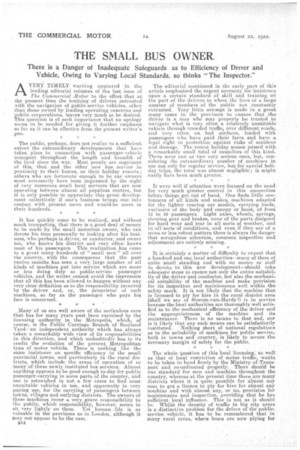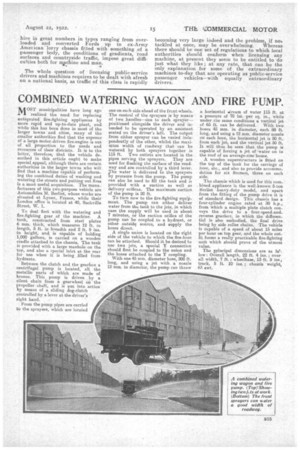THE SMALL BUS OWNER.
Page 14

Page 15

If you've noticed an error in this article please click here to report it so we can fix it.
There is a Danger of Inadequate Safeguards as to Efficiency of Driver and Vehicle, Owing to Varying Local Standards, so thinks "The Inspector."
AVERY TIMELY warning appeared in the leading editorial columns of the last issue of The Commercial Motor to the effect that at ithe present time the training of drivers entrusted with the navigation of public-service vehicles, other than those owned by leading operating concerns and public corporations, leaves very much to be desired. This question is of such importance that no apology seems to be needed for giving it further emphasis so far as it can be effective from the present writer's
pen. .
The public, perhaps, does not realize to a sufficient extent the extraordinary developments that have taken place in connection with passenger-vehicle transport throughout the length and breadth of the land since the war. Most people are cognizant of thisz that and the other new bus service in proximity to their homes, or their holiday resorts ; others who are fortunate enough to be car owners must necessarily have been impressed by the sight of very numerous small local services that are now operating between almost all populous centres, but it is only possible to appreciate this great development collectively if one's business brings one into contact with present users and would-be users in their hundreds.
It has quickly come to be realized, and without much trumpeting, that there is a good deal of money to be made by the small motorbus owner, who can devote his time personally to looking after his business, who perhaps is driver, or conductor, and owner too, who knows his district and very often knows most of his passengers. This realization has come to a great many hundreds of " small men" all over the country, with the consequence that the past twelve months has seen a very large number of all kinds of machines put into service which are more or less doing duty as public-service passenger vehicles, and the writer cannot avoid the impression that all this has been allowed to happen without any very clear definition as to the responsibility incurred by the driver and, or, the proprietor of such machines, so far as the passenger who pays his fare is concerned.
Many'of us are well aware of the meticulous care that has for many' years past been exercised by the licensing authority in the Metropolis, which, of course, is the Public Carriage Branch of Scotland Yard—an independent authority which has always taken a remarkably wide view of its responsibilities' in this direction, and which undoubtedly has to its credit the evolution of the present Metropolitan. typeof motor vehicle. There is nothing like the same insistence on specific efficiency in the small provincial towns, and particularly in the rural districts, which include the areas of operation of so many of these newly instituted bus services. Almost anything appears to be good enough to-day for public passenger-carrying in some parts of the country, and one is astonished in not a few cases to find most unsuitable vehicles in Use . and apparently in very paying use, for the carrying of passengers between towns, villages and outlying districts. The owners Of these machines incur a very grave responsibility to the public, which responsibility, however, seems to sit very lightly on them. Yet' human life is as valuable in the provinces as in London, although it may not appear to be the ease.
B14 The editorial mentioned in the early part of this article emphasized the urgent necessity for insistence upon a certain standard of skill and training oil the part of the drivers to whom the lives of a large number of members of the public are constantly entrusted. .Very little attempt is made in a great many cases in the provinces to ensure that the driver is a man who may properly be trusted to navigate what is very often a relatively unsuitable vehicle through crowded traffic, over different roads, and very often on bad surfaces, loaded with passengers who have paid their fares and have a legal right to protection against risks of accident and damage. The recent holiday season passed with a remarkably small total of casualties of this kind. There were one or two very serious ones, but, considering the extraordinary number of machines in use not only for regular service, but, for special holiday trips, the total was almost negligible ; it might easily have been much greater.
It were well if attention were faciised on the need for very much 'greater control in this connection before things get. out of hand. One finds little one-• tonners of all kinds and makes, machines adapted for the lighter touring car models, carrying loads, exclusive of the body and canopy or hood, of front 12 to 16 passengers. Light axles, wheels, springs, steering gear and brakes, none Of the parts designed for hard wear and tear in all sorts of weather, and in all sorts of conditions, and 6ven if they are of a more or less robust pattern there is always the danger that scrupulous attention, constant inspection and adjustment are entirely missing.
It is certainly a matter of difficuItY to expect that a hundred and one local authorities—many of them of quite small standing and with no money or staff to devote to this new development—should take adequate steps to ensure not only the entire suitability of the driver and conductor, but also the mechanical suitability of the machine and make provision for its inspection and maintenance well within the safety mark. It is not likely that the machine that is licensed to ply for hire in the rural district area .(shall we say of Sloeurneum-Hardy?) is in service because the local authorities are thoroughly well satisfied as to the mechanical efficiency of the driver and the appropriateness of the machine and its maintenance. There is no means to that end, Mir is itlikely that any such means can be satisfaetorily instituted. Nothing short of national regulations as to the suitability of machines for public service, both in towns and country, is likely to secure the necessary margin of safety for the public.
The whole question of this local licensing, as well as that of local restriction of motor traffic, wants to be taken in hand firmly by the Ministry of Transport and co-ordinated properly.There should be one standard for men and machine throughout the country, whereas at the present time there are many districts where it is .quite possible for almost any man to get a licence to ply for hire for almost any machine and with almost any, or no, provision for maintenance and inspection, providing that he has sufficient local influence. This is not as it should be. Whilst the density of traffic in big city areas is a distinctive problem for the driver of the publicservice vehicle, it has to be remembered that many rural areas,. where buses are now plying for
hire in great numbers in types ranging from overloaded and converted Fords up to ex-Arrny Ames ican lorry chassis fitted with something of a passenger body, the conditions of gradients, road surfaces and countryside traffic, impose great difficulties both for michine and man.
The whole question of licensing public-service drivers and machines requires to be dealt with afresh on a national basis, as traffic of this class is rapidly
becoming very large indeed and the problem, if no tackled at once, may be overwhelming. Whereas there should be one set of regulations to which local authorities should conform when licensing any machine, at present they seem to be entitled, to do just what they like ; at any rate, that can be the only explanation for some of . the extraordinary machines to-day that are operating as public-service passenger vehicles—with equally extraordinary drivers.


































